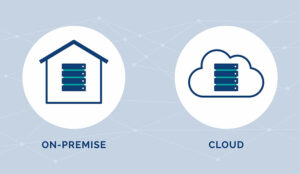Martin Cross of Connect Managed introduces us to cloud contact centres, sharing key some points to consider before making the move.
In contact centres around the world, a battle is raging.
The prize: the best customer experience, underpinned by efficient, scalable, and flexible technology.
Many would have you believe there are only two contenders: the cloud contact centre (Contact Centre as a Service (CCaaS)), and the more conventional contact centre infrastructure (CCI). The reality, however, is much more complex.
While both CCaaS and CCI have their advantages, neither has emerged the clear winner in all cases. Comparisons between the two have failed to take into account the whole picture.
For large business-to-consumer (B2C) businesses the prize might fall to a third challenger: the hybrid model, which combines best-in-class technologies customised to your business and delivered over the cloud.
What Is the Cloud?
The cloud is just another term for the internet. The origin of the term stems from how the internet was represented in technical diagrams (as a cloud).
When you choose to store information or run applications in the cloud, it simply means storing data and running applications over the internet instead of on your own computer or local network.
Cloud computing has been around since the 1950s, when small organisations (think schools, local councils, and so on) shared IBM mainframes to run their terminals. As they couldn’t afford their own mainframe, access was split between several users to cut costs.
Over time, however, as server costs fell, businesses began purchasing their own dedicated servers and data infrastructure.
In the last ten to twenty years, this trend has been reversing. Advances in network speed and capacity have made it easier than ever to subcontract all data handling – be it storage, processing, or sharing – to a cloud provider with the bandwidth and hardware to handle everything efficiently and at low cost.
This has led to the rapid growth of the “as-a-service” business model. Instead of buying all the hardware and software licences you need to run your business, you can hire them from a cloud computing provider on a pay-as-you-go basis.
So whether you’ve got ten employees or fifty, you can provide the same service level to your customers without worrying about buying and installing new hardware as you grow.
Some of the most successful businesses in the world are cloud-based, including Netflix, Spotify, and DropBox. The first two being Content-as-a-Service, the latter Storage-as-a-Service.
You will also find databases (DBaaS), payments processing (PaaS), infrastructure (IaaS), and now, contact centres (CCaaS) on a consumption-based, pay-as-you-go cloud service.
The question is, should you choose CCaaS for your own business?
What Is the Cloud Contact Centre (CCaaS)?
The cloud contact centre (CCaaS) combines all the usual services expected of a modern, customer-centric contact centre under one provider.
Just like contact centre infrastructure (CCI), you’ll have access to some or all of the following services, depending on your business needs:
- Call routing
- Outbound
- Interactive voice response
- Speech recognition
- Text-to-speech
- Natural language understanding
- Artificial intelligence (AI)
- Workforce management (WFM)
- Speech analytics
- Webchat
- Email routing
- Video agent
- Co-browsing
- MI
You access all of these services through the cloud (CCaaS) provider, not your own hardware (CCI). All you need is a fast, resilient internet connection.
Why Choose CCaaS Over CCI?
If you’re responsible for transforming a business – whether that’s increasing revenue, efficiency, or improving customer service – CCaaS presents a compelling argument. Although it doesn’t offer the customisation of CCI, offering a suite of standard applications instead of best-in-class software, it can provide a number of big advantages.
As in the 1950s, today’s small businesses can’t always afford the hardware and software licences they need. Nor can they afford upgrades and new technology as their business grows.
This is especially true of start-ups, whose growth can outpace the time and investment needed to ensure their contact centre has the capacity to serve its customers well.
In most cases, a cloud contact centre is ready to go, out of the box. That means little to no set-up costs, and saving the time spent installing hardware, software, networking, and ensuring they’re all working in harmony.
Gartner estimates the cost of downtime as “$5,600 p/minute, which extrapolates to well over $300K p/hour”, so for any organisation undergoing transformation, minimising downtime is vital.
CCaaS gives you economies of scale that might’ve been out of reach. As your business grows, CCaaS grows with you. There is no need to buy new hardware – you simply pay for the capacity and functionality you need, as you need it, on a subscription basis.
Also, all future upgrades are free: as your provider upgrades its CCaaS platform, you always access the best, most recent version.
One drawback of CCI is it often means agents have to learn multiple systems, which often don’t interact well with each other, and are only accessible in the office or on a particular device (such as their work computer).
Not only does this make the job a chore, but it slows down service and hinders their ability to resolve issues. Unhappy employees leave, and a high staff turnover is just another obstacle to providing the best customer experience. These issues multiply should you need to upgrade or change applications.
CCaaS, on the other hand, experiences fewer of these issues because all the applications are integrated under a single UI for all channels (social media, email, phone, and so on). This makes it easier to manage and prioritise workflow, which increases NPS and customer satisfaction KPIs.
Jaime Bailey at VHT notes the benefits of a well-integrated customer experience:
…high-effort experiences that require multiple steps or transfers could quickly cause customers to not want to recommend a company to friends or colleagues. In contrast, seamless, personalised journeys or unexpectedly impressive, proactive interactions could propel customers to sing the praises of a company.
Also, the CCaaS platform permits access from virtually any internet-enabled device, which means you can offer 24-7 customer service, from anywhere in the world.
Also, in the event of a disaster, agents can work off-site from homes, coffee shops, or temporary offices. This kind of flexibility is rarely found in a strictly CCI environment.
CCaaS might also help increase revenue and market share. Better customer experiences lead to higher retention, and many CCaaS platforms can collate data from different applications to help drive customer acquisition and retention.
This could be by identifying weaknesses in sales funnels or service points (analytics), or in developing a strategy for hitting customer relationship management (CRM) targets.
The cloud is popping up in boardroom agendas all over the world. Embracing it now could mark you as a visionary in digital transformation, avoiding loss of market share to more innovative competitors… but before you start looking for a CCaaS provider, there are some important caveats to consider.
Why CCaaS Isn’t Right for Everyone
For some time now, analysts and industry experts have claimed CCaaS as the panacea to all of CCI’s problems. But as stated at the beginning, the truth is more complex than a simple CCaaS vs CCI debate.
First, CCaaS isn’t right for every business. Large contact centres might already have economies of scale which make the CCaaS model redundant.
Worse, CCaaS could actually cost more if, for example, call volumes are high, or you need deeper integration with your existing infrastructure.
Cost comparisons between the two aren’t representative of the real world, either. Does a contact centre of 100 staff need 100 software licences for each channel? Probably not, as not every agent will be on every channel (some will do email, social media, and so on).
The same applies to different business models and customer profiles. Will Monza (a mobile-only bank that prefers messaging) ever need as many call routing licences as First Direct (which has a “voice first” philosophy)? Does SAGA need as big a social media support team as ASOS? Unlikely.
Finally, CCaaS applications, while integrated, aren’t always best-in-class. They might excel in a few applications, but are average in others, and you need to decide whether that works for your business.
Will it guarantee a customer-winning experience? Is it the right fit for your operations, business model, customers, and existing infrastructure?
An off-the-rack suit or dress might look good for some, but for the perfect fit you need a tailor.
The Hybrid Model: Best of Both Worlds?
If you’re running an SME or B2B firm, CCaaS could be the right answer for you. Small businesses stand to benefit the most. Since B2B contact centres are usually narrower in scope than B2C (out-of-hours support is less important for some B2B markets, for example), they can also enjoy the flexibility and scalability of a CCaaS build.
But if you’re a larger business, or specialise in B2C, then a hybrid of CCI and CCaaS could be the best choice.
Many best-in-class applications are now deliverable over the cloud, so you could handpick the best software for your business and still enjoy all the benefits of CCaaS.
If you’ve already got the right suite under CCI, then simply host your existing applications in the cloud – through AWS, for example – and leverage all the benefits of scale, flexibility, and efficiency while providing world-leading service to your customers.
Author: Robyn Coppell
Published On: 6th Jun 2019 - Last modified: 19th Jul 2022
Read more about - Guest Blogs, Connect Managed















